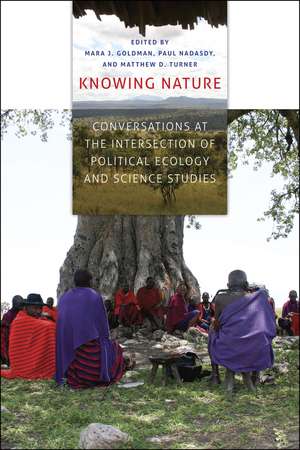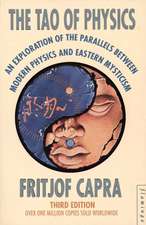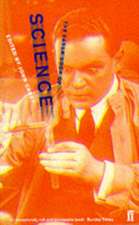Knowing Nature: Conversations at the Intersection of Political Ecology and Science Studies
Editat de Mara J. Goldman, Paul Nadasdy, Matthew D. Turneren Limba Engleză Paperback – 18 apr 2011
Political ecology and science studies have found fertile meeting ground in environmental studies. While the two distinct areas of inquiry approach the environment from different perspectives—one focusing on the politics of resource access and the other on the construction and perception of knowledge—their work is actually more closely aligned now than ever before.
Knowing Nature brings together political ecologists and science studies scholars to showcase the key points of encounter between the two fields and how this intellectual mingling creates a lively and more robust ecological framework for the study of environmental politics. The contributors all actively work at the interface between these two fields, and here they use empirical material to explore questions of theoretical and practical import for understanding the politics that surround nature-society relations, from wildlife management in the Yukon to soil fertility in Kenya. In addition, they examine how various environmental knowledge claims are generated, packaged, promoted, and accepted (or rejected) by the different actors involved in specific cases of environmental management, conservation, and development. Finally, they ask what is at stake in the struggles surrounding environmental knowledge, how such struggles shape conceptions of the environment, and whose interests are served in the process.
Knowing Nature brings together political ecologists and science studies scholars to showcase the key points of encounter between the two fields and how this intellectual mingling creates a lively and more robust ecological framework for the study of environmental politics. The contributors all actively work at the interface between these two fields, and here they use empirical material to explore questions of theoretical and practical import for understanding the politics that surround nature-society relations, from wildlife management in the Yukon to soil fertility in Kenya. In addition, they examine how various environmental knowledge claims are generated, packaged, promoted, and accepted (or rejected) by the different actors involved in specific cases of environmental management, conservation, and development. Finally, they ask what is at stake in the struggles surrounding environmental knowledge, how such struggles shape conceptions of the environment, and whose interests are served in the process.
Preț: 387.98 lei
Nou
Puncte Express: 582
Preț estimativ în valută:
74.24€ • 76.59$ • 61.95£
74.24€ • 76.59$ • 61.95£
Carte tipărită la comandă
Livrare economică 27 martie-10 aprilie
Preluare comenzi: 021 569.72.76
Specificații
ISBN-13: 9780226301419
ISBN-10: 0226301419
Pagini: 376
Ilustrații: 22 halftones, 8 line drawings, 6 tables
Dimensiuni: 152 x 229 x 23 mm
Greutate: 0.5 kg
Ediția:New.
Editura: University of Chicago Press
Colecția University of Chicago Press
ISBN-10: 0226301419
Pagini: 376
Ilustrații: 22 halftones, 8 line drawings, 6 tables
Dimensiuni: 152 x 229 x 23 mm
Greutate: 0.5 kg
Ediția:New.
Editura: University of Chicago Press
Colecția University of Chicago Press
Notă biografică
Mara J. Goldman is assistant professor of geography at the University of Colorado–Boulder. Paul Nadasdy is associate professor of anthropology and American Indian studies at Cornell University. Matthew D. Turner is professor of geography at the University of Wisconsin–Madison.
Cuprins
Introduction
Mara J. Goldman and Matthew D. Turner
Mara J. Goldman and Matthew D. Turner
Part 1
PRODUCTION OF ENVIRONMENTAL KNOWLEDGE: SCIENTISTS, COMPLEX NATURES, AND THE QUESTION OF AGENCY
Introduction
Matthew D. Turner
1 Politicizing Environmental Explanations: What Can Political Ecology Learn from Sociology and Philosophy of Science?
Tim Forsyth
2 Debating the Science of Using Marine Turtles: Boundary Work among Species Experts
Lisa M. Campbell
3 Technobiological Imaginaries: How Do Systems Biologists Know Nature?
Joan H. Fujimura
4 Agency, Structuredness, and the Production of Knowledge within Intersecting Processes
Peter J. Taylor
5 Fermentation, Rot, and Other Human-Microbial Performances
Mrill Ingram
6 Ferricrete, Forests, and Temporal Scale in the Production of Colonial Science in Africa
Chris Duvall
Part 2
APPLYING ENVIRONMENTAL KNOWLEDGE: THE POLITICS OF CONSTRUCTING SOCIETY/NATURE
Introduction
Paul Nadasdy
7 “We Don’t Harvest Animals; We Kill Them”: Agricultural Metaphors and the Politics of Wildlife Management in the Yukon
Paul Nadasdy
8 Political Violence and Scientific Forestry: Emergencies, Insurgencies, and Counterinsurgencies in Southeast Asia
Peter Vandergeest and Nancy Lee Peluso
9 Spatial-Geographic Models of Water Scarcity and Supply in Irrigation Engineering and Management: Bolivia, 1952–2009
Karl Zimmerer
10 The Politics of Connectivity across Human-Occupied Landscapes: A Look at Corridors near Nairobi National Park, Kenya
Mara J. Goldman
Part 3
CIRCULATION OF ENVIRONMENTAL KNOWLEDGE: NETWORKS, EXPERTISE, AND SCIENCE IN PRACTICE
Introduction
Mara J. Goldman
11 Rooted Networks, Webs of Relation, and the Power of Situated Science: Bringing the Models Back Down to Earth in Zambrana
Dianne Rocheleau
12 Circulating Science, Incompletely Regulating Commodities: Governing from a Distance in Transnational Agro-food Networks
Ryan E. Galt
13 Reclaiming the Technological Imagination: Water, Power, and Place in India
Roopali Phadke
14 Circulating Knowledge, Constructing Expertise
Rebecca Lave
15 Experiments as “Performances”: Interpreting Farmers’ Soil Fertility Management Practices in Western Kenya
Joshua J. Ramisch
Conclusion
Matthew D. Turner
References
List of Contributors
Index
Recenzii
“A timely call for a more nuanced analysis of the ‘politics of knowledge’ informing environmental management. Mara Goldman, Paul Nadasdy, and Matthew Turner have crafted a coherent conversation between political ecology and science and technology studies (STS) that aims to cross-pollinate these two intellectual traditions into a collaborative, reinvigorated critical project. . . . Knowing Nature succeeds in making transparent both established and emerging interdisciplinary scholarly methods. Its great value is to engage political ecology’s commitment to environmental justice so as to ground the seeming abstraction and impracticality of actor-network theory and its derivatives. For instructors seeking an accessible yet rigorous resource for courses engaging concepts of nature or environmental politics, Goldman, Nadasdy, and Turner have provided an ‘on the ground’ orientation to which many students and scholars will be drawn. Theirs is a practical repackaging—delivering neat, palatable bites of a sometimes indigestibly complex theoretical platter. As Knowing Nature’s contributors demonstrate, when it comes to knowledge about the nature of things, distribution is paramount, and a smooth delivery system is key to circulating/applying/(re)producing any given knowledge offering.”
“Thoughts of prominent scholars of political ecology meet up with science and technology studies in this collection of essays. Ably edited by experts in environmental and political learning, the text covers three major themes: the breadth of environmental knowledge; the impact of politics on human behavior in regard to management of nature; and the circulation and practice of new scientific concepts. Educators and students in these fields will find this work a valuable reference to a variety of scientific and policy issues.”
“Political ecology powerfully joins forces with science and technology studies in these wide-ranging essays to argue that descriptions of nature are never neutral. Knowledge, even scientific knowledge, always comes from somewhere. It is the product of particular perspectives and partial visions. This is a timely message from an exceptionally distinguished array of authors spanning several disciplines. In a time of despair for many environmentalists, they offer hope that a new politics of inclusivity, in knowledge and power, is possible—and will lead us forward.”
“Knowing Nature takes very seriously the notion that politics courses through the scientific networks engaged in the production, deployment, and mobilization of environmental knowledge. Goldman, Nadasdy, and Turner offer a robust, indeed pathbreaking, conversation between political ecologists, grounded in the contested politics of access to and control over the biophysical world, and students of science and technology studies attentive to the production—social, political, institutional—of scientific knowledge and practice. To know nature, they argue, is to grasp how multiple expert agents not only produce knowledge about the environment but struggle to authorize, legitimize, and deploy it. Knowing Nature draws the reader into the heady world of assemblages, hybrids, and the co-production of natural and social orders. This is a bold and provocative book.”
“Knowing Nature is an ambitious, illuminating, and much-needed series of original research papers and reflections on the marriage of political ecology with science and technology studies. It comprises research that is equally at home in undoing the intricacies of quantitative, complex models as in guiding the reader through the density of poststructuralist thought. Brilliantly led by Mara J. Goldman, Paul Nadasdy, and Matthew D. Turner—three of the most important scholars of the environment today—it will be welcomed and avidly read by students and scholars alike, and will repay their interest with deeper insights and ways of conceiving the relationship between ways of doing and knowing.”
“At a time when conservation, climate change, and poverty are merging into a single global agenda; when through a complex institutional alchemy biodiversity is being reduced to carbon; when the resolute clarity of models routinely elide complexity and erase the particularity of place; and when place-based conservation is giving way to market-based mechanisms that encompass production landscapes—it is imperative that existing approaches to knowing nature be reconsidered. Knowing Nature explores the confluence of political ecology and science and technology studies and in doing so challenges our understanding of the politics of knowledge and the making of nature(s).”















